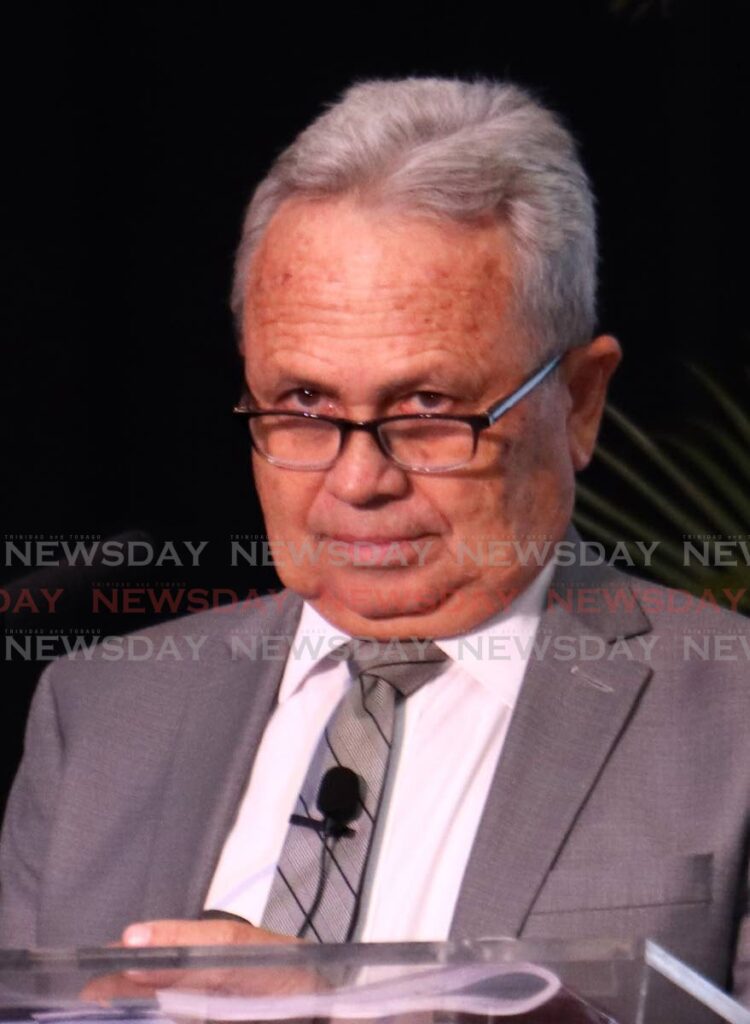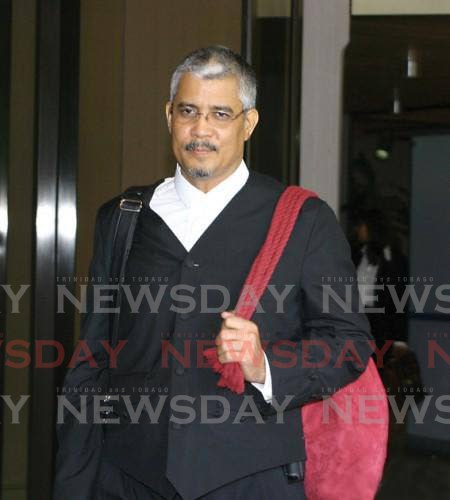[UPDATED] Auditor General free to challenge State — Imbert flops in Privy Council

THE Privy Council has dismissed an appeal by Finance Minister Colm Imbert and the Cabinet against the judicial permission given to Auditor General Jaiwantie Ramdass to pursue her lawsuit challenging a state-ordered probe of her approach to auditing the 2023 public accounts.
This means Ramdass’s lawsuit will progress to trial.
On November 7, five Privy Council law lords gave their immediate decision on Imbert's challenge of the reversal of the premature dismissal of her lawsuit.
Two hours into submissions by the State’s lead attorney Douglas Mendes, SC, the law lords took a break, returning about ten minutes later with their decision without hearing from Ramdass’ attorneys.
“Given the importance of the matter, the Board is prepared to state the outcome of the appeal and give its reasons afterwards.
“In short, the test for arguability is low and as Mr Mendes recognised, he needed a knockout blow to show that the Court of Appeal was plainly wrong in making its decision.
“The board was not satisfied that has been shown…Leave was granted on the pleaded grounds and the question of arguability will be heard if the judicial review proceeds on the merits.
“Therefore, the Court of Appeal’s order will stand, and as I say, the board will state its reasons as soon as is practicable,” Lord Hodge said after he and his colleagues returned just around 8.56 am local time.
WHO NO PROBE OF IMBERT'S CONDUCT?
The hearing began at 6.30 am local time and during the two hours he was on his feet, trying to deliver the knockout blow for Imbert, Mendes was peppered with questions from the judges, chief among them being: "To what extent is the minister’s conduct going to be investigated? She (Ramdass) was singled out, but not him.”
Lady Simler asked this of Mendes repeatedly.
Earlier, she asked, “Why do the terms of reference not include the minister (Imbert)? That would be even-handed.”
On June 21, the Appeal Court gave Ramdass permission to pursue her lawsuit against Imbert and the Cabinet.
However, the State appealed to the Privy Council, asking TT's highest court to determine whether Ramdass should be permitted to test in the courts the May 7 decision of Imbert – then acting as prime minister – and the Cabinet to investigate her and her office.
Lords Hodge, Sales, Stephens and Ladies Rose and Simler presided over the appeal.
Mendes began his opening salvo by acknowledging "the uphill task” he and his team faced to convince the council that the Appeal Court should not have granted leave to Ramdass.
Almost immediately he was asked if there was evidence of how Imbert came up with the terms of reference for the investigative team, led by a retired high court judge, to probe Ramdass.
Mendes sought to emphasise arguabilty and bias points, but one of the law lords pointed out to him that Ramdass’s written case set out the extent Imbert involved himself to make the bias argument arguable.
However, Mendes insisted that Ramdass had to make her allegation of “improper conduct" clear so the decision-maker would know what they had to answer to.
“It should have been made upfront. If you are going to allege bias, that you have acted for an improper purpose, you have to make that clear. It should have been made upfront," he argued.
Mendes was also unsuccessful in his entreaty for the council to express a view on the constitutionality point, raised by the Auditor General, that Imbert is prohibited from initiating such a probe against her outside section 136 of the Constitution, which sets out procedures for disciplinary action involving officers including the Auditor General.
He said Cabinet’s interest was in finding out what happened with the public accounts.
MENDES TRIED, BUT FAILED
Mendes referred to the case involving the Law Association and Chief Justice Ivor Archie – which the Appeal Court rejected – to suggest the investigation of the auditor general was not a disciplinary one.
However, he was faced with the Law Lords' question: “But if she refuses to participate, there may be disciplinary action?”
Mendes plugged on. “Something important happened with the public accounts and he (Imbert) wants to know what happened.
“But they got her response…” Lady Simler countered.
“She is saying she was bullied and it is one-sided. Why do the terms of reference not include the minister…?”
Mendes referred to responses the minister and the Attorney General gave in Parliament on Ramdass’s allegations, in which Imbert had described her refusal to initially accept the public accounts as “bizarre.”
During his submissions, Mendes said this followed Ramdass’s allegations that there was an attempt to backdate the accounts and “sweep the understatement” under the carpet, accusing the ministry’s staff of unethical conduct.
He insisted a possible outcome of the investigation was that complaints could be made to relevant disciplinary bodies.
He said the Appeal Court was asked, but, “They did not go beyond there being an arguable case.”

Mendes said it would be a waste of financial resources if the point had to return to the Privy Council. He said Imbert wanted to know if the investigation was unconstitutional so he could exercise one of several options of either starting over, going to trial or ending it.
The response to his suggestion from the Law Lords was: “It seems strange that you are asking for what sounds like summary judgment before the board.”
Mendes said it was untrue that there was an attempt to backdate the second set of accounts.
Ramdass was represented by Anand Ramlogan, SC, Kent Samlal, Natasha Bisram and Aasha Ramlal.
Also representing Imbert and the Cabinet were SCs Michael Quamina and Simon de la Bastide.
THE CASE
The dispute between Ramdass and the minister began in April, after the ministry sought to deliver amended public accounts to explain and rectify an error in which government revenue was understated to the original sum of $3.4 billion, and subsequently to $2.6 billion.
The statutory deadline to provide the accounts was January 31. Ramdass was given the first set of accounts for 2023, which was audited but not yet submitted, when she was told by the ministry that the first accounts were understated by $2.6 billion.
By statute, the Auditor General has to annually audit the public accounts provided by the ministry.
On April 15, the ministry sent new accounts which had allegedly been backdated and contained a significantly higher statement of revenue.
Ramdass initially refused to accept the second set of accounts, arguing her office had completed the audit, but relented after legal action was threatened. In her legal challenge, she claims she was bullied into accepting the second set of accounts.
Ramdass’ office audited the second set of accounts, but said her audit team could not reconcile the increase in revenue reported by the ministry. This was noted in the audit report submitted to Parliament on the 2023 accounts.
On May 7, the Ministry of Finance announced the appointment of the investigative team to probe the understatement of revenue for the 2023 financial year. The team, led by retired judge David Harris, was selected to look into Ramdass’ response to the second accounts, her audit report statements, and any related matters, while making findings and recommendations.
On May 16, Ramdass’ legal team sought permission to have the court review the appointment of a team to investigate her, arguing this move was tainted by apparent bias and breached her constitutional protections. Her team argued that neither Imbert nor Cabinet has the jurisdiction to probe the conduct of the Auditor General.
On June 21, Justice Westmin James refused her application. This was overturned by the Appeal Court in June. Ramdass was permitted to pursue her challenge before another judge. The investigation of Ramdass and her office was also stopped.
However, the Harris team was allowed to continue all other parts of its terms of reference.
In his ruling, James held that section 116(6) of the Constitution, which insulates the Auditor General from being under the direction and control of any other power or authority, could not apply to investigations such as the one ordered by the Cabinet.
He also said Ramdass failed to prove bias by Imbert, as he noted that the minister and his ministry were also subject to the probe.
However, Appeal Court judges Mark Mohammed, Peter Rajkumar and James Aboud held that the threshold for granting leave in such a case was low.
“Leave will therefore be granted because as a matter of law, the low arguability threshold has been attained,” Rajkumar ruled.
In its ruling, the Appeal Court held that the legal precedent set in the case involving the Chief Justice was different from Ramdass’ case, despite James's belief that the case applied.
Rajkumar held in that case, the association did not have a vested interest in the outcome of the investigation into the Chief Justice’s alleged conduct.
In submissions before both local courts, the minister’s lawyers claimed the reconciliation after the initial estimate revealed that the variance was in fact $2,599,278,188.72, which was attributed to Value Added Tax (VAT), individual, business levy and Green Fund Levy contributions.
They also claimed that checks in relation to the approximate $780 million difference between the initial and final estimated variances attributed it to tax-refund cheques to taxpayers issued for the 2022 financial year being cashed in the financial year 2023.
They attributed the error to the Central Bank's switch from a manual to an electronic cheque-clearing system.
They claimed there was no backdating, as they noted that the allegation was made because a document related to the original public accounts was inadvertently included in the revised documents.
They also contended that Ramdass acted illegally in initially refusing to accept the amended accounts.
Imbert eventually agreed to lay the original report in Parliament and did so on May 24.
His decision was based on the understanding that Ramdass would issue a special report clarifying her initial report, based on the amended records provided.
Ramdass was also represented by Kent Samlal, Natasha Bisram, and Aasha Ramlal. Michael Quamina, SC, and Simon de la Bastide, SC, also represented Imbert and the Cabinet.
Editor's Note: This is an update to an earlier story which can be read by clicking the link: https://newsday.co.tt/2024/11/07/privy-council-dismisses-finance-ministers-appeal-in-auditor-general-impasse/

Comments
"[UPDATED] Auditor General free to challenge State — Imbert flops in Privy Council"